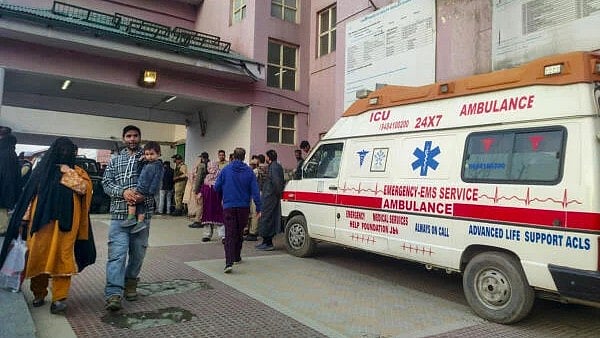
A representative image of a hospital in Jammu & Kashmir.
Credit: PTI Photo
Srinagar: The unmasking of the alleged “white-collar terror module” involving young medicos has jolted Kashmir’s healthcare community and, for the first time in decades, shaken the deep trust that security forces placed in the medical fraternity.
The acts attributed to a few individuals, investigators say, have cast a long shadow on an entire profession that had largely remained above suspicion throughout the Valley’s turbulent years.
Right from 1989, when armed insurgency erupted in Kashmir, doctors and health workers were among the only groups whom security forces routinely exempted from frisking, identity checks, and barricade stoppages. The assumption was clear: medical staff were neutral lifesavers, and obstructing them could cost precious lives. Even at the peak of militancy, ambulances and doctors moved with a freedom rarely afforded to any other segment of society.
That unwritten covenant of trust has now been shaken.
The arrest of several young medical professionals—paired with revelations that one of the accused doctors allegedly recorded videos rehearsing arguments to justify suicide attacks—has sparked a wave of suspicion now seeping into hospital corridors, emergency wards, and medical college campuses. Senior doctors worry that the fallout could fundamentally alter how security agencies view the medical community.
A senior consultant at a Srinagar tertiary-care hospital said the development has “deeply punctured the trust built painstakingly over three decades.” He added, “Even in the worst years of the 1990s, security personnel rarely stopped doctors. They believed we were neutral and dedicated to saving lives. Today, the acts of a few have cast an entire fraternity under an undeserved cloud.”
Medical students across institutions say that routine life has already changed. At SKIMS Medical College and GMC Srinagar, students report heightened security checks around hostels and teaching hospitals. Some say they have been questioned about friends, discussion groups, and online circles—an unfamiliar intrusion in spaces that once enjoyed unquestioned access.
The episode has triggered introspection among senior clinicians about how sections of the medical student community may have become vulnerable to online radical propaganda.
Medicine was once considered insulated from such influences,” a senior professor at GMC, wishing anonymity said. “But the digital ecosystem has changed that. These young people are bright and ambitious, but they’re exposed to the same toxic content as others. We need to understand how a doctor reached a point of seeking ideological validation for violence.”
The unease is not confined to Kashmir. Kashmiri doctors posted in other cities of the country say they are suddenly facing awkward questions from colleagues and patients. “We spent years fighting the stereotype that Kashmiris are suspect,” said a young surgeon in Delhi. “Now one case has put us back at square one.”
Security officials privately admit that the longstanding “no-check” protocol for medical professionals may no longer be tenable. While no formal orders have been issued, there is quiet acknowledgement that protocols governing doctors’ movement in sensitive areas are under review.
Public health experts warn that this erosion of trust could have serious implications. “Healthcare systems run on mutual trust—between doctors and patients, and between medical responders and security agencies,” said a former health administrator. “If security forces begin to second-guess doctors or ambulances, even during emergencies, the cost could be measured in lives.”
Despite the unease, many in the fraternity hope clarity from the investigation will help restore confidence. “One misguided doctor cannot define 10,000 of us,” a pediatrician at a Srinagar hospital said.
As Kashmir grapples with the fallout, both the medical community and security agencies are navigating a new and unsettling reality—how to safeguard the sanctity of healthcare while confronting the uncomfortable emergence of radicalisation from unexpected quarters.